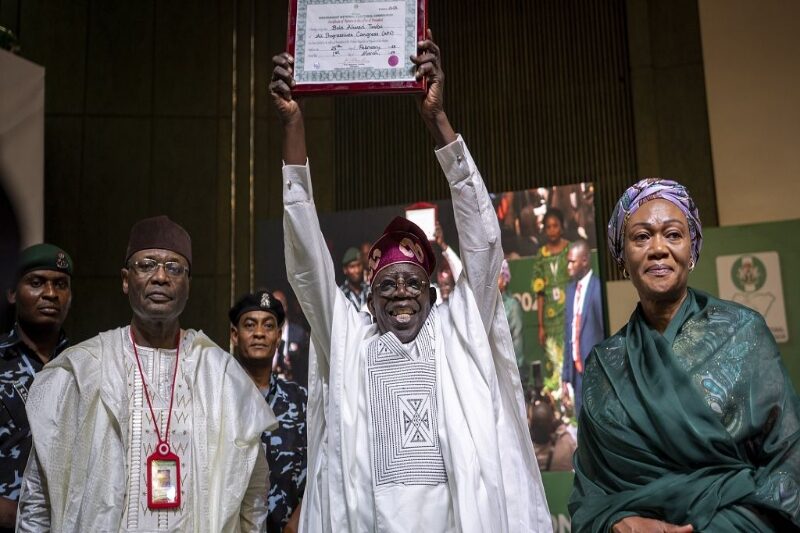Thousands of people gathered at Eagle Square in Abuja on Monday, May 29, to celebrate Bola Tinubu being sworn in as the new president of Africa’s most populous nation.
Dressed in colourful attire, the crowd watched bands, army parades, dances and several performances showcasing the diverse Nigerian cultural heritage.
Dignitaries and foreign heads of states – including from the UK, US, Canada, China, India, Turkey, Algeria, Rwanda, the Niger Republic, South Africa and Sierra Leone – attended the high-profile inauguration.
Security was tight at the 5,000-capacity square.
General Lucky Irabor, the chief of defence staff, handed the National and Defence Flags to former president Muhammadu Buhari, who in turn handed them over to the new president as he was sworn into office.
Kashim Shettima was sworn in as the country’s new vice-president.
Tinubu has undertaken a tough job. Under the previous government, Nigeria experienced much turmoil, ranging from insecurity to unemployment and inflation.
In his first speech, Tinubu said: “I stand before you honoured to assume the sacred mandate you have given me. My love for this nation is abiding. My confidence in its people, unwavering. And my faith in God Almighty, absolute. I know that His hand shall provide the needed moral strength and clarity of purpose in those instances when we seem to have reached the limits of our human capacity.”
He paid tribute to Buhari saying: “You have been an honest, patriotic leader who has done his best for the nation you love. On a more personal note, you are a worthy partner and friend. May history be kind to you.”
Tinubu said Nigeria had endured hardships that could make any society crumble.
“We shall take steps to make food affordable, remove the oil subsidy and work to reduce the high interest rate. Hope is back for Nigeria.”
He said the principles that would guide the new administration were simple:
1. Nigeria will be impartially governed according to the constitution and the rule of law.
2. We shall defend the nation from terror and all forms of criminality that threaten the peace and stability of our country and our subregion.
3. We shall remodel our economy to bring about growth and development through job creation, food security and an end to extreme poverty.
4. In our administration, women and youth will feature prominently.
5. Our government will continue to take proactive steps such as championing a credit culture to discourage corruption while strengthening the effectiveness and efficiency of the various anti-corruption agencies.
About security he said: “Security shall be the top priority of our administration because neither prosperity nor justice can prevail amid insecurity and violence. To effectively tackle this menace, we shall reform both our security doctrine and its architecture.
“We shall invest more in our security personnel and this means more than an increase in number. We shall provide, better training, equipment, pay and firepower.”
On the economy, he said the target was a higher GDP growth and to significantly reduce unemployment, saying that budgetary reform stimulating the economy without engendering inflation would be instituted.
The country would use the full range of fiscal measures to promote domestic manufacturing and lessen import dependency.
He promised electricity would become more accessible and affordable to businesses and homes alike. Power generation should nearly double and transmission and distribution networks improved.
“My administration must create meaningful opportunities for our youth. We shall honour our campaign commitment of one million new jobs in the digital economy.
“Our government also shall work with the National Assembly to fashion an omnibus jobs and prosperity bill. This bill will give our administration the policy space to embark on labour-intensive infrastructural improvements, encourage light industry and provide improved social services for the poor, elderly and vulnerable.
Tinubu said about agriculture: “Rural incomes shall be secured by commodity exchange boards guaranteeing minimal prices for certain crops and animal products. A nationwide programme for storage and other facilities to reduce spoilage and waste will be undertaken.”
Agricultural hubs would be created throughout the nation to increase production. The livestock sector would be introduced to the best modern practices and steps would be taken to minimise the perennial conflict over land and water resources in this sector.
Through these actions, food would be made more abundant yet less costly. Farmers would earn more while the average Nigerian would pay less.
He said the fuel subsidy could no longer justify its ever-increasing costs in the wake of drying resources.
“We shall instead re-channel the funds into better investment in public infrastructure, education, healthcare and jobs that will materially improve the lives of millions.”
Monetary policy needed thorough housecleaning, he said. The Central Bank of Nigeria (CBN) needed to work towards a unified exchange rate. Interest rates needed to be reduced to increase investment and consumer purchasing in ways that sustain the economy at a higher level.
Tinubu said: “Whatever merits it had in concept, the currency swap was too harshly applied by the CBN given the number of unbanked Nigerians. The policy shall be reviewed. In the meantime, my administration will treat both currencies as legal tender.”
Babagana Umara Zulum was re-elected and sworn as the Borno State governor for another four years.
In his speech, the governor promised to rectify electricity in the state, to resettle internally displaced persons (IDPs) into their communities and improve the education system.
Dauda Isa, from Maiduguri, the capital of Borno State, said: “I’m happy and hope well for the new government. However, our major problem is that many youths are unemployed. We have applied for so many government vacancies, including with the police and the Civil Defence Corps, but all to no avail. I plead with the new government to please consider youths and provide more jobs.”
AISHA SD JAMAL









